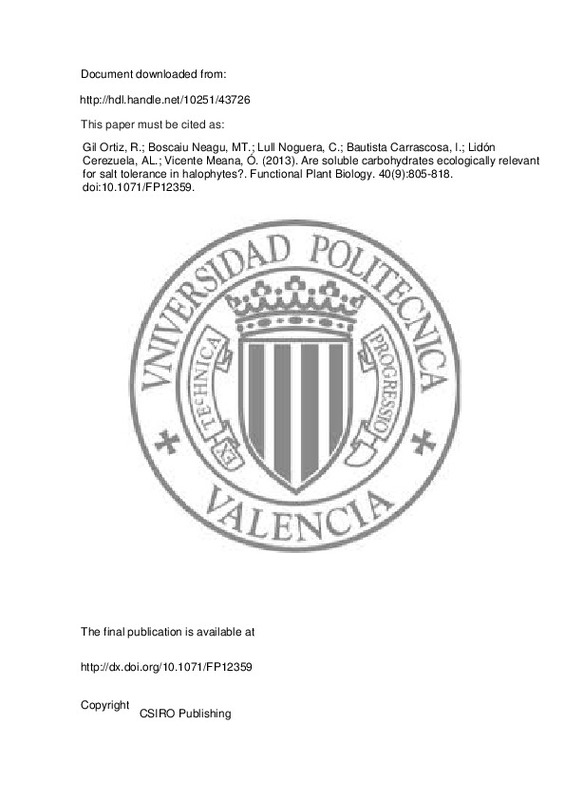JavaScript is disabled for your browser. Some features of this site may not work without it.
Buscar en RiuNet
Listar
Mi cuenta
Estadísticas
Ayuda RiuNet
Admin. UPV
Are soluble carbohydrates ecologically relevant for salt tolerance in halophytes?
Mostrar el registro sencillo del ítem
Ficheros en el ítem
| dc.contributor.author | Gil Ortiz, Ricardo
|
es_ES |
| dc.contributor.author | Boscaiu Neagu, Mónica Tereza
|
es_ES |
| dc.contributor.author | Lull Noguera, Cristina
|
es_ES |
| dc.contributor.author | Bautista Carrascosa, Inmaculada
|
es_ES |
| dc.contributor.author | Lidón Cerezuela, Antonio Luis
|
es_ES |
| dc.contributor.author | Vicente Meana, Óscar
|
es_ES |
| dc.date.accessioned | 2014-10-30T09:18:04Z | |
| dc.date.available | 2014-10-30T09:18:04Z | |
| dc.date.issued | 2013-05-14 | |
| dc.identifier.issn | 1445-4408 | |
| dc.identifier.uri | http://hdl.handle.net/10251/43726 | |
| dc.description.abstract | [EN] A general response of plants to high soil salinity relies on the cellular accumulation of osmolytes, which help the plant to maintain osmotic balance under salt stress condition and/or act as osmoprotectants with chaperon or reactive oxygen species (ROS) scavenging activities. Yet the ecological relevance of this response for the salt tolerance mechanisms of halophytes in their natural habitats remains largely unknown. In this review, we describe and discuss published data supporting the participation of compatible solutes in those mechanisms, with especial focus on soluble carbohydrates. Evidence for a functional role of carbohydrates in salt tolerance include: (i) relatively high levels of specific sugars and polyols have been detected in many halophytic taxa; (ii) an increase in salt tolerance has often been observed in parallel with increased intracellular levels of particular soluble carbohydrates, in transgenic plants overexpressing the corresponding biosynthetic enzymes; (iii) there are several examples of genes involved in carbohydrate metabolism which are induced under salt stress conditions; (iv) specific sugars or polyols have been shown to accumulate in different halophytes upon controlled salt treatments; and (v) although very few field studies on environmentally induced carbohydrate changes in halophytes exist, in general they also support the involvement of this type of osmolytes in salt stress tolerance mechanisms. We also highlight the complexities of unequivocally attributing carbohydrates a biological role in salt tolerance mechanisms of a given tolerant species. It is proposed that research on halophytes in their natural ecosystems should be intensified, correlating seasonal changes in carbohydrate contents with the degree of environmental stress affecting the plants. This could be an important complement to experiments made under more controlled (but artificial) conditions, such as laboratory set-ups. | es_ES |
| dc.description.sponsorship | Work in the authors' laboratories was funded by a grant to O.V. from the Spanish Ministry of Science and Innovation (Project CGL2008-00438/BOS), with contribution by the European Regional Development Fund. | |
| dc.language | Inglés | es_ES |
| dc.publisher | CSIRO Publishing | es_ES |
| dc.relation.ispartof | Functional Plant Biology | es_ES |
| dc.rights | Reserva de todos los derechos | es_ES |
| dc.subject | Abiotic stress | es_ES |
| dc.subject | Biochemical diversity | es_ES |
| dc.subject | Carbohydrate metabolism | es_ES |
| dc.subject | Osmotic adjustment | es_ES |
| dc.subject | Salt stress | es_ES |
| dc.subject | Salinity stress | es_ES |
| dc.subject.classification | BOTANICA | es_ES |
| dc.subject.classification | EDAFOLOGIA Y QUIMICA AGRICOLA | es_ES |
| dc.subject.classification | BIOQUIMICA Y BIOLOGIA MOLECULAR | es_ES |
| dc.title | Are soluble carbohydrates ecologically relevant for salt tolerance in halophytes? | es_ES |
| dc.type | Artículo | es_ES |
| dc.identifier.doi | 10.1071/FP12359 | |
| dc.relation.projectID | info:eu-repo/grantAgreement/MICINN//CGL2008-00438/ES/RESPUESTAS DE LAS PLANTAS AL ESTRES ABIOTICO: CORRELACION CON LAS CARACTERISTICAS EDAFICAS DE SUS HABITATS NATURALES/ | es_ES |
| dc.rights.accessRights | Abierto | es_ES |
| dc.contributor.affiliation | Universitat Politècnica de València. Instituto Universitario Mixto de Biología Molecular y Celular de Plantas - Institut Universitari Mixt de Biologia Molecular i Cel·lular de Plantes | es_ES |
| dc.contributor.affiliation | Universitat Politècnica de València. Departamento de Ecosistemas Agroforestales - Departament d'Ecosistemes Agroforestals | es_ES |
| dc.contributor.affiliation | Universitat Politècnica de València. Departamento de Química - Departament de Química | es_ES |
| dc.contributor.affiliation | Universitat Politècnica de València. Departamento de Biotecnología - Departament de Biotecnologia | es_ES |
| dc.description.bibliographicCitation | Gil Ortiz, R.; Boscaiu Neagu, MT.; Lull Noguera, C.; Bautista Carrascosa, I.; Lidón Cerezuela, AL.; Vicente Meana, Ó. (2013). Are soluble carbohydrates ecologically relevant for salt tolerance in halophytes?. Functional Plant Biology. 40(9):805-818. https://doi.org/10.1071/FP12359 | es_ES |
| dc.description.accrualMethod | S | es_ES |
| dc.relation.publisherversion | http://dx.doi.org/10.1071/FP12359 | es_ES |
| dc.description.upvformatpinicio | 805 | es_ES |
| dc.description.upvformatpfin | 818 | es_ES |
| dc.type.version | info:eu-repo/semantics/publishedVersion | es_ES |
| dc.description.volume | 40 | es_ES |
| dc.description.issue | 9 | es_ES |
| dc.relation.senia | 252519 | |
| dc.contributor.funder | Ministerio de Ciencia e Innovación |







![[Cerrado]](/themes/UPV/images/candado.png)

